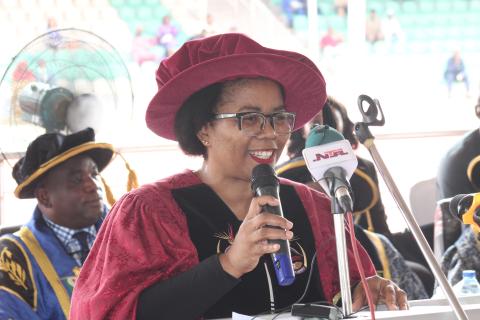
Prof. LenkaBula
The Principal and Vice-Chancellor, University of South Africa (UNISA), Prof. Puleng LenkaBula, has called on higher institutions in Africa to rebuild a system of learning and research that recognises and promotes African knowledge systems, African civilizations and African languages.
These, according to her, form the cradles from which Africans emerge, stressing the significance of using African languages as languages of research, innovation and mediating the exclusions that arise.
She stated this while delivering the 12th Convocation Lecture of the National Open University of Nigeria (NOUN), on Friday, March 24, 2023, at the university’s headquarters, Jabi, Abuja.
The UNISA VC, who spoke on the topic: “Volatility and Opportunities in Higher Education, ”noted that building a robust research system puts African higher institutions on the path to owning their own future by becoming inventors of technology and not only consumers of technology.
LenkaBula, a professor of Social Ethics and the first female Vice- Chancellor in the institution’s 150 years of existence, said “it is urgent for the universities to be at the centre of the formulation of research and policy interventions that attend to questions of exclusions whether it’s the access to education, educational opportunities and epistemological exclusions.
“The pan-African university must influence higher rates investment in research, development and innovation (RD&I). Presently, we have very few African countries that invest more than 1% of their GDP in RD&I and we also need to reclaim our research agenda from foreign lands.”
The lecturer identified the pre-colonial, colonial, post-colonial and the contemporary Africa as the major periods of volatility in higher education in Africa.
She said “The African universities must deal with the legacies of colonialism, racism and apartheid and cultural imperialism from transformation to development of infrastructure, partnerships and sustainable funding.
“The pan-African university must, out of necessity, help Africa achieve Goal 2 Agenda 2063, where we will have well-educated citizens and skills revolution underpinned by science, technology and innovation.”
Institutions like NOUN and UNISA, she said, “whether acting individually or collectively as partners, must satisfy a variety of public expectations in so far as teaching, learning, research and engaged scholarship is concerned. And they do so in an increasingly volatile, uncertain, complex, and ambiguous world.”
LenkaBula, therefore, called on African universities to prioritise focus on education, science, technology and innovation driven skills revolution.
Earlier, the Vice-Chancellor, National Open University of Nigeria (NOUN) and chairman of the occasion, Prof. Olufemi Peters, in his remarks, described the convocation lecturer as an invaluable scholar and commended her for her wealth of knowledge and experience especially in the area of open and distance learning.
The lecture attracted different calibre of people, including the representative of the ministry of education, the neighbouring Economic and Financial Crimes Commission chairman, AbdulRashid Bawa, diplomats, as well as the academia.

